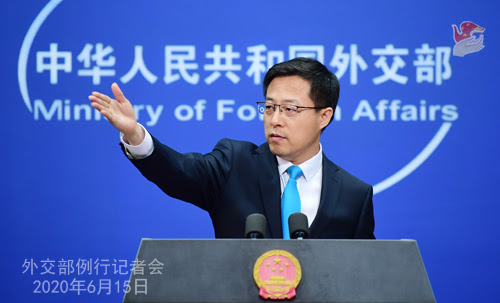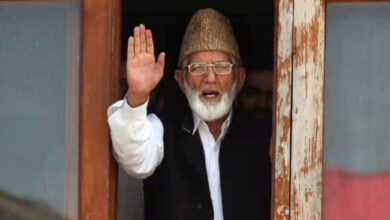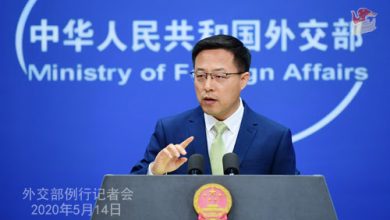China and the US remain in communication with each other through diplomatic channels

State Councilor and Foreign Minister Wang Yi will co-chair with Deputy Prime Minister Hor Nam Hong of Cambodia the fifth meeting of China-Cambodia Intergovernmental Coordination Committee on June 16. The meeting will be held through videolink.
CCTV: What will be the focus of the forthcoming fifth meeting of China-Cambodia Intergovernmental Coordination Committee you just announced? What is your expectation for this meeting?
Zhao Lijian: This year marks the 10th anniversary of the China-Cambodia comprehensive strategic cooperative partnership as well as the first anniversary of the action plan for building a community with a shared future for the two sides. In the face of the sudden COVID-19 outbreak, the two countries stood together and secured a major victory over the virus. Bilateral relations have emerged stronger after going through the joint fight.
At this virtual meeting, China hopes the two sides will take stock of steps taken in the past year to implement the bilateral action plan for building a community with a shared future, and exchange ideas on how to enhance cooperation in various areas while fighting COVID-19 on an ongoing basis as well as on regional and international issues of mutual interest. We are confident that the event will further deepen China-Cambodia friendship and strengthen the community with a shared future for the two countries.
Global Times: A Canadian Security Intelligence Service (CSIS) report disclosed by a Canadian court on June 12 shows that CSIS got a heads-up from the US Federal Bureau of Investigation about Meng Wanzhou’s arrest on December 1, 2018, at Vancouver International Airport. The CSIS report says FBI will not be present at Meng’s arrest in order to avoid the perception of influence. Meng’s lawyers claim that this report is proof CSIS was conscious of obscuring the involvement of the FBI. Documents already disclosed demonstrate that the FBI is in frequent contact with Canadian law enforcement. What is your comment?
Zhao Lijian: The report disclosed by the Canadian court is another proof that the arrest of Ms. Meng Wanzhou is an outright political case with grave consequences. It fully exposed the political motive of the US side to oppress China’s hi-tech companies like Huawei. Canada has been acting as an accomplice in this case.
The Chinese government is determined to protect the legitimate rights and interests of the Chinese citizens and enterprises. We once again urge the Canadian side to take seriously China’s solemn position and concerns, immediately release Ms. Meng Wanzhou and ensure her safe return to China, and take no more steps down the erroneous path.
Reuters: SCMP reported over the weekend that Yang Jiechi, Member of the Political Bureau of the Communist Party of China (CPC) Central Committee and Director of the Office of the Foreign Affairs Commission of the CPC Central Committee, met with or is about to meet Secretary of State Pompeo in Hawaii over the weekend. Can you confirm whether this meeting happened and, if so, can you share any details about it?
Zhao Lijian: China and the US remain in communication with each other through diplomatic channels. If we have more information to offer, we will release it timely.
Australian Broadcasting Corporation: First, over the weekend, it was announced by the Guangzhou Intermediate People’s Court that an Australian drug trafficker Karm Gilespies has been given a death sentence. Why is there no transparent record from the court? And the second question is, given this announcement came in the middle of a period of diplomatic tension between Australia and China, why shouldn’t Australians read into the timing of the announcement as being linked to the recent diplomatic tension?
Zhao Lijian: On your first question, drug-related crimes are considered serious crimes worldwide. Chinese law retains death sentence and controls its application strictly. Death sentence for drug-related crimes that are extremely dangerous will help deter and prevent such crimes. Chinese law stipulates that every criminal is equal in the application of the law. China’s judicial authorities handle cases involving criminals of different nationalities in accordance with law. In this case, the local court in China reached a verdict in an open trial with all the criminal facts well established. The Chinese side will continue to ensure the legal rights of the person involved and facilitate consular visits by the Australian side in accordance with international conventions and the Agreement on Consular Relations between Australia and China.
On your second question, China’s judicial authorities handle the relevant case independently in strict accordance with Chinese law and legal procedures.
China News Service: It is said that an information exchange and matchmaking conference will be held online for Chinese and Central and Eastern European Countries’ SMEs on resuming work and production. Could you share some details?
Zhao Lijian: The virtual information exchange and matchmaking conference between Chinese and CEEC SMEs on resuming work and production will be held on June 16. It is hosted by the Secretariat for Cooperation between China and CEECs and the 17+1 SME Coordination Mechanism based in Croatia and sponsored by China Centre for Promotion of SME Development at the Ministry of Industry and Information Technology, the municipal government of Cangzhou and the China-CEEC SME Cooperation Zone (Cangzhou). At the upcoming event, an online service platform for cooperation between Chinese and CEEC SMEs will be launched, information of participating enterprises will be displayed and matchmaking opportunities will be provided in the four sectors of industry & industrial manufacturing, trade investment & agriculture, tourism & people-to-people exchange, and medical products & health.
China has achieved major strategic outcome in epidemic prevention and control at home, and the epidemics in CEECs has also been brought under control. Given that, accelerating resumption of work and production and socio-economic development has become a shared goal of governments of all countries. For both China and CEECs, SMEs represent an important source of economic vitality and play a main role in creating jobs, which bears directly on the livelihood of numerous households. Impacted by the pandemic, SMEs now face many challenges and some are struggling to survive. Since the COVID-19 outbreak, the Chinese government has taken proactive measures to provide strong support to Chinese SMEs by expanding overall demand, increasing financial support to market players and so on. In the meantime, China is willing to leverage the platform of China-CEEC cooperation to strengthen information-sharing, create more opportunities for the resumption of economic opportunities and cooperation between SMEs on both sides and minimize the pandemic’s impact on them as much as possible.
Xinhua News Agency: A group of Chinese medical experts has returned to China after aiding the fight against COVID-19 in Algeria and Sudan. Could you share with us more details about their work in the two countries?
Zhao Lijian: At the invitation of the governments of Algeria and Sudan, the 20-member anti-epidemic medical expert team, organized by the National Health Commission and consisting of members selected by the governments of Chongqing Municipality and the Macao Special Administrative Region, left for Algeria on May 14 and returned home after completing their mission by charted flight on June 12.
During their stay in Algeria and Sudan, the experts carried out a series of exchange & training programs, on-site inspections and case discussions concerning COVID-19 with local government officials, technical experts, local WHO offices and medics of the two countries and shared epidemic prevention and control measures and treatment experience with them. They also made technical suggestions.
The Chinese experts visited hospitals, laboratories and research institutes, and held technical exchange meetings, on-site guidance sessions and themed training sessions for 5400 people. They also offered multilingual papers on epidemic prevention and control to the two countries’ health departments, which include anti-epidemic suggestions to
During their stay in Algeria and Sudan, the team also conducted exchange via videoconference with government officials and technical experts from Egypt, South Sudan, Morocco and Mauritania and provided anti-epidemic technical training and guidance to overseas Chinese in these countries.
Foreign Journalist: This is a follow-up to the case of Karm Gilespie. There’s a view in Australia that because of the timing of this case, it’s very difficult to separate it from the diplomatic tensions between Beijing and Canberra. What would you say to that? Also, would China consider representation from Australia to commute the death penalty?
Zhao Lijian: I have already made clear the position of the Chinese government.
In accordance with law, the local court in China reached a verdict in an open trial with all the criminal facts well established. Drug-related crimes are considered felony worldwide. Death sentence for drug-related crimes that are extremely dangerous will help deter and prevent such crimes. Everyone is equal before the law. China’s judicial authorities handle the relevant case independently in strict accordance with Chinese law and legal procedures. The Australian side should respect China’s judicial sovereignty.
Beijing Media Network: The Chinese Embassy in Myanmar released information recently on a fast lane for essential travels between the two sides. Could you tell us more about this arrangement?
Zhao Lijian: China and Myanmar share an over 2,200 km-long boundary line along which people of both countries travel to and fro in their daily life. Since the onset of COVID-19, the two sides have implemented stringent prevention and control measures, maintained close collaboration, and established a joint containment mechanism covering border provinces. This is done in accordance with the outcomes of President Xi Jinping’s historic visit to Myanmar in January and consensus between the two heads of state in their phone call in May while taking into consideration the reality that the two countries are linked by mountains and rivers and people travel back and forth frequently. There has been no COVID-19 case imported either way to date.
On the basis of these joint efforts, the two sides launched a fast lane to facilitate essential travels in a bid to coordinate efforts of containing the virus and resuming work and production. Through this mechanism, personnel on critical posts of oil and gas, electricity and infrastructure projects have traveled back and resumed work. This concrete step in building a community with a shared future for the two sides will help advance the China-Myanmar Economic Corridor and socioeconomic development in both countries.
Reuters: There was a report from Beijing CDC official who said that early sequencing of the virus outbreak discovered in Xinfadi this past weekend show that the sample origin was likely from Europe. Just wondering if China shared the sequencing with the WHO? I understand they may have asked for it.
Zhao Lijian: China and WHO maintain close communication. I’m not aware of the specifics that you are interested in and would refer you to the competent authorities.





